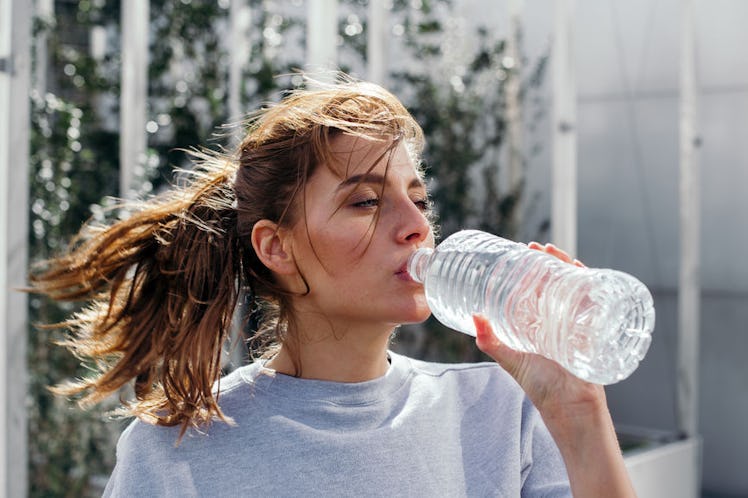
The Ridiculously Simple Home Remedy You Haven't Considered Yet For Your Headaches
I’ve never been a big drinker — and no, I’m not talking about alcohol. I was always the kid who’d pour herself a tall glass of whatever beverage was offered at the dinner table, but only gulp down maybe a quarter of the cup. Needless to say, my mom did not appreciate the waste. This led to my having a serious dehydration dilemma later in life, and I’m pretty sure that’s the main reason why I experienced such serious migraines. Drinking water helps headaches, so the fact that I’d skimp on sipping any kind of liquids with my meals, let alone meeting the FDA-recommended daily intake of water (which is 64 ounces, BTW), it’s no wonder painkillers hardly made a difference: I was barely drinking enough to even wash them down.
You don’t have to worry about me these days, though. After forcing myself to drink the recommended amount of 64 ounces of water every day for a week to see if the health benefits were really worth the effort, I now go through water like, well, water. Once in a while I’ll get too distracted with work, or whatever's keeping me busy from one hour to the next, but I can absolutely tell whether or not I hydrated enough during the day if, by the end of the night, I’m feeling particularly sluggish and my head feels kind of funky. This is what I like to refer to as the dehydration deflation, when a lack of water drains the life out of me. And, according to registered dietitian Leah Silberman, of Tovita Nutrition, I’m not being completely dramatic here. It turns out, too little water intake can cause some pretty big problems for your brain.
But first, allow me to clarify what it actually means to be dehydrated. Per the Mayo Clinic’s definition, dehydration occurs “when you use or lose more fluid than you take in.” See, according to the United States Geological Survey, 60 percent of your adult body is water, and in order to function properly, you need to constantly be nourishing your body with fluids. If your body doesn’t have enough fluids to go around, it can’t perform to its optimal potential, and when that happens, Mayo Clinic explains, so does dehydration.
There’s a laundry list of red flags and subtle symptoms of dehydration, and headaches are no exception to the lot. “While there are many different reasons for headaches, dehydration headaches specifically are caused when there is a negative balance between fluid intake and output, which basically means you're losing more water than you're taking in, possibly disrupting electrolyte balance, blood flow, and blood pressure,” Silberman tells Elite Daily over email. Basically what happens is, when you’re dehydrated, your blood pressure drops, and when your blood pressure drops, not enough blood or oxygen is flowing to the brain. In an attempt to restore blood pressure, “the vessels in your brain may dilate,” Silberman explains, therefore exerting more energy than it can handle, and ultimately resulting in a nasty headache.
It's obviously better to drink a little something than it is to not drink anything at all, but when you’re nursing a dehydration headache, you definitely want to try your best to sip on something throughout the day. Grace Derocha, a registered dietitian, certified diabetes educator, and certified health coach, suggests, the minute you suspect a headache has been brought on by dehydration, pour yourself a glass of water and sip it — don’t chug it.
“It’s important to drink slowly, since consuming too much water too quickly can result in nausea or drop the sodium level in your blood to dangerous levels,” Derocha tells Elite Daily, adding that, while she recommends starting with an eight-ounce glass of water, you can rehydrate by eating fruits and veggies with high water content, too. “Mix it up with fruits, vegetables, coconut water, or sparkling water,” she says, but make sure to “steer clear of caffeinated drinks because they are diuretics and will decrease the amount of water in your body.”
And, because I’m almost positive you’d much rather be safe than sorry, do yourself a favor and start drinking more water on the reg. Once upon a time, my father used to leave three bottles of water in the driver’s seat of my Buick every morning for an entire summer in an attempt to force me to drink the damn stuff. Do what you have to to drink up, people. As for how much water you should be drinking, Silberman suggests sticking to "the 8x8 rule," or two liters per day. “Many of my clients complain about getting up to refill their water bottles at work — so I recommend keeping those large 30-ounce bottles of CORE water at your desk so you don't have to constantly refill throughout the day,” she tells Elite Daily.
Also, keep in mind that, if you’re a coffee or alcohol drinker, these types of beverages can be super dehydrating, so Silberman says it's best to compensate for each glass with a glass of water. Bottoms up!
This article was originally published on